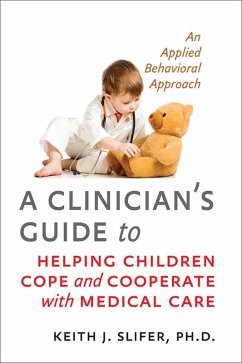How adults can help children cope with routine and traumatic medical care.Keith J. Slifer, a pediatric psychologist at the Kennedy Krieger Institute and the Johns Hopkins University School of Medicine, explores how adults can help children cope with routine and traumatic medical care. He draws on practice and research to help health care practitioners provide better care for children with chronic conditions and children undergoing rehabilitation after traumatic injury or surgery. By better understanding the behavior, emotions, and developmental challenges of children, health care professionals in practice and in training can solve a range of problems, from getting a distressed child to cooperate with a physical examination or diagnostic test, to teaching a child to adhere to medical self-care.More than 9 million children in the United States regularly visit health care professionals for treatment of chronic or recurrent health conditions. These children experience multiple doctors' visits, trips to the emergency department, hospital admissions, anesthesia, surgery, medications, needle sticks, wound cleaning, seizures, nausea, vomiting, pain, and fear. While most of these children are developing typically in terms of their intellectual and cognitive functioning, many children with intellectual, developmental, and physical disabilities also require frequent medical care, and as chronic health conditions increase, so do the chances of having developmental, learning, emotional, and behavioral problems.A Clinician's Guide to Helping Children Cope and Cooperate with Medical Care will benefit health care professionals and children as practitioners aim both to improve medical care and to prevent the children's behavior from disrupting clinics and distressing and frustrating health care workers and family caregivers. This book is for pediatric psychologists, pediatricians, family medicine practitioners, physician's assistants, nurse specialists, pediatric subspecialists, and students in these fields-and for family members dedicated to helping their children cope with medical procedures and to getting the best possible medical care.
Dieser Download kann aus rechtlichen Gründen nur mit Rechnungsadresse in A, B, BG, CY, CZ, D, DK, EW, E, FIN, F, GR, HR, H, IRL, I, LT, L, LR, M, NL, PL, P, R, S, SLO, SK ausgeliefert werden.









